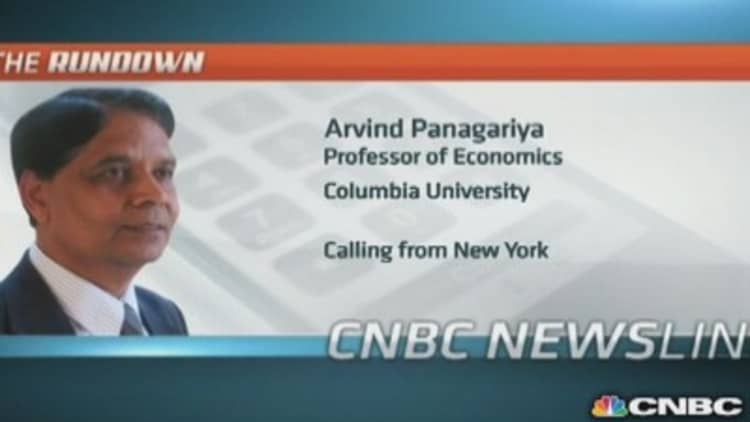
A Columbia University professor, tipped to be an economic adviser to India's new prime minister, says the country needs to lift capital spending to revive the economy even if that means a higher fiscal deficit.
"I am a fiscally conservative economist. At the same time we've got to worry about the revival of economic growth and that requires some increased spending on infrastructure," Arvind Panagariya, a professor of economics at Columbia, told CNBC on Wednesday.
Read MoreCorporate leaders pin hopes on a Modi-fied India
Panagariya said that increased capital expenditure would result in a higher fiscal deficit, but not by a significant degree.
"Last year's fiscal deficit was 4.6 percent of GDP [gross domestic product] and it could be 4.5 percent this year which is relative to the estimate in the current budget of 4.1 percent, so it is not a large rise," he said.
"The interim budget calls for 1.7 percent of GDP to be spent on capital expenditure. I am saying bring it to 2 percent in the current year. So that's not giving up on the fiscal deficit," Panagariya added.
According to a report from Reuters, India's finance ministry is working on a plan to reduce the deficit to as low as 3.8 percent of GDP.
Panagariya, an Indian born economist and a former chief economist at the Asian Development Bank, is seen as a front runner for a key advisory post in India's new government led by Narendra Modi, according to reports in the local media.
Read MoreUnder Modi, can India's economy take on China?
Panagariya declined to comment on that speculation in his interview with CNBC.
Modi was inaugurated as India's Prime Minister earlier this week following a landslide election win for his Hindu-nationalist Bharatiya Janata Party (BJP).
Modi has promised to revive growth prospects and boost investment in India, Asia's third biggest economy, and focus is on the new government's budget expected in July.
India's economy grew 4.7 percent in the final quarter of 2013, down from its near-9 percent expansion in fiscal 2011.
Amid last year's rout in emerging markets on fears of a tapering of U.S. monetary stimulus, India came under fire for its wide current-account deficit and slow pace of economic reform – sparking a sharp sell-off in India's markets.
Both the currency and equity market, which hit a record high following Modi's win, have staged strong comebacks – partly on expectations that a new-business friendly government will turn around India's fortunes.
Read MoreThe top 4 priorities for India's new government
Asked what would be at the top of the agenda should he become an economic adviser to Modi, Panagariya identified these main areas: reduce uncertainty in the taxation system, address the large number of restructured loans in the banking sector and bring down the time and costs involved in land acquisitions.
"There has been some history of retrospective taxation that has left some investors, especially the foreign ones, very miffed," he said. "There are also lots of taxes that companies don't expect that turn up. So, that uncertainty needs to end."


